Stokes, Broad, Root & Bayliss - why England are exciting
- Published
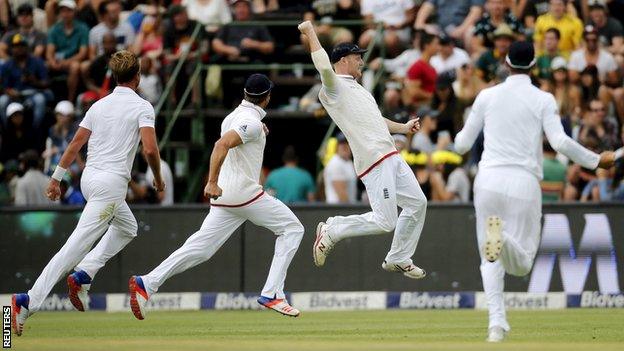
England's win in South Africa is their first series victory away from home since 2012
Perhaps the most surprising aspect of England's series victory over South Africa was that, in the end, beating the world number ones was not a surprise at all.
Yes, the Proteas were without fast bowlers Dale Steyn and Vernon Philander but, even before England arrived, they seemed a team in decline.
In contrast, England have been on an upward curve in all formats since the beginning of last summer thanks to a change of management, the right players in the right roles and a new aggressive style.
Alastair Cook's side have knocked South Africa from the top of the world rankings,, external but remain fifth themselves. However, home series against Sri Lanka and Pakistan this summer and then a tour of Bangladesh before a very difficult trip to India present the chance to improve that status.
The Ashes, lost in a whitewash, have been regained, and the limited-overs cricket is a world away from the humiliation of the 2015 World Cup.
There are plenty of reasons to be excited about the England cricket team.
Ben Stokes
Probably the most exciting Test cricketer in the world right now.
Ben Stokes hits the ball hard, bowls fast and catches flies. Though he has the ability to change the course of match in the space of a session, he is much more than an impact player.
For all that his 258 in the second Test against South Africa seemed like the work of a one-man highlight reel, it was also a sustained assault of the sort very few in the world can pull off.
Removing Kane Williamson and Brendon McCullum in successive balls in the first Test against New Zealand in May was exhilarating, but Stokes was also able to pound away over after over to take 6-36 in the Ashes-sealing win at Trent Bridge.
"In Stokes, England have a cricketer who will cause headaches for teams all around the world," wrote former England captain Michael Vaughan.
"He has a touch of genius about him and shows just what talent England boast."
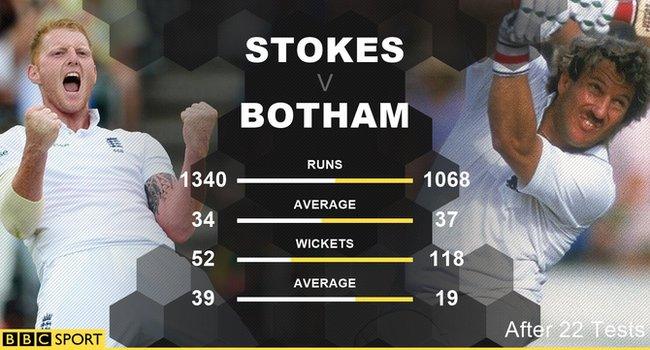
Match-winners
There was a time not too long ago when England relied almost exclusively on the runs of Alastair Cook and Joe Root, and the wickets of James Anderson.
Yes, Cook and Root still need more help from the rest of the top five, but South Africa have been beaten with Cook and Anderson barely contributing.
England are now blessed with the type of match-winners who made their two most recent formidable Test sides - Vaughan's Ashes-winners of 2005 and Andrew Strauss's class of 2010-11 - so successful.
Stokes forms a lethal lower order with Jonny Bairstow and Moeen Ali, who was also named man of the match in the first Test for the seven wickets he took with his off-breaks.
As Anderson has struggled for fitness, Stuart Broad has flourished to the extent that he is now ranked as the number one Test bowler in the world. The resurgent Steven Finn has arguably been England's most consistent threat in South Africa.
"Broad, Stokes and Root can all turn the momentum in a session," said BBC cricket correspondent Jonathan Agnew. "We know what a fully fit Anderson is capable of and Finn showed during the Ashes that he can bowl a magic spell."
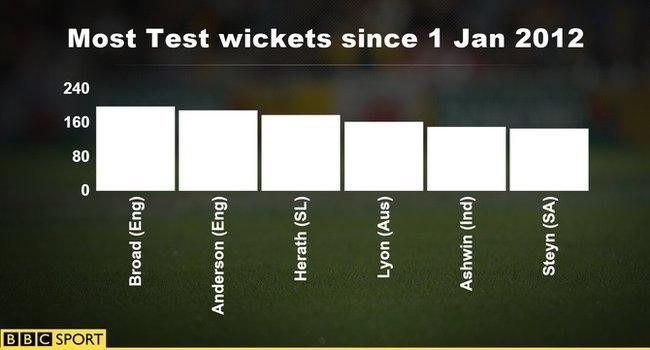
Time on their side
Of the 11 who played for England in the series-clinching win against South Africa in Johannesburg, eight were under the age of 30, while captain Cook has only just turned 31.
"The majority of them have a number of years left in them and it really is a side that should get better and better," Vaughan told BBC Radio 5 live.
With youth, comes exuberance. The England team that won three consecutive Ashes series between 2009 and 2013 was successful, but not necessarily popular thanks to a turgid, attritional style.
When in doubt, the England of 2016 attack. At the beginning of last summer, a naturally aggressive group of players were gathered and given the freedom to play by the new management. They may also have been inspired by Brendon McCullum's New Zealand.
"England looked at New Zealand and thought 'we can play cricket like this'," said Agnew.
Vaughan added: "For two or three years England were attritional because of the players they had. Now when England get going it is very difficult to top them."
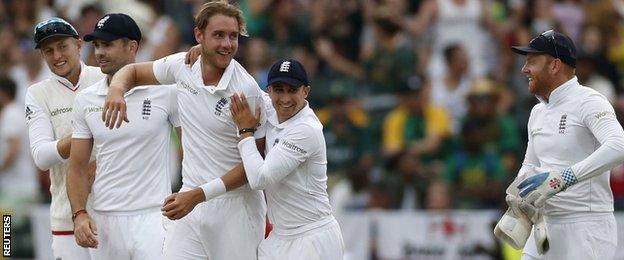
The average age of the England XI in the third Test against South Africa was 28
The Bayliss effect
While England's gradual improvement began after the dismissal of former coach Peter Moores, it is unfair to simply say it is a result of his exit.
More accurate would be say England have benefited from a change of approach. Moores' hands-on method, arguably stifling, has been replaced by the laid-back, work-in-the-shadows of Trevor Bayliss.
The Australian may be economical with his words, but that seems to be an approach that suits this talented England team, who listen when he speaks. Cook even admitted that a "kick up the backside" was delivered by Bayliss at lunch on day three in Johannesburg.
"I certainly don't raise the voice, but the message gets across in my way," said Bayliss. "Probably the proof is in the pudding - they then went out and backed that up."
Bayliss was, in part, hired for his limited-overs expertise. Experience of the Indian Premier League would boost an England team that had fallen behind the rest of the world in white-ball cricket. A measure of how successful he has been will come at the World Twenty20 in March.
But England teams are always judged on Test results and, more specifically, the Ashes. Looking ahead to the Australia trip in 2017-18, how sweet would it be for Bayliss, a New South Welshman, to be holding the urn in Sydney?
But still some things to fix
Before the Ashes, England's most daunting Test assignment will be the trip to India at the end of this year. To win there, they will need Moeen to improve his bowling average in Asia from its current 48.
More importantly, England still need to settle on their top three. Alex Hales and Nick Compton, brought into the side for the South Africa series, are yet to cement their places, even if they have been backed by Bayliss.
In particular Hales, Cook's eighth opening partner since 2012, needs a score in the fourth and final Test, especially after being caught by the keeper or slips in four or his six innings so far.
"To me, he hasn't got the technique," said former England batsman Geoffrey Boycott. "He may have talent for hitting the ball in one-day cricket, but I don't think he can survive for a time in Test cricket."
Runs for Hales in the final Test would cap the tour for England. Even with failure, he could get more chances in the summer, or Compton could be promoted to create a space for the likes of Gary Ballance or James Vince. The make-up of the top order is the final piece of England's puzzle.
"There are good times ahead," said Vaughan. "If they can get some consistency at the top of the order, they will really take come beating.
"Everyone will talk about Australia. Can England go there and really compete? I think they can."
- Published17 January 2016

- Published17 January 2016

- Published16 January 2016
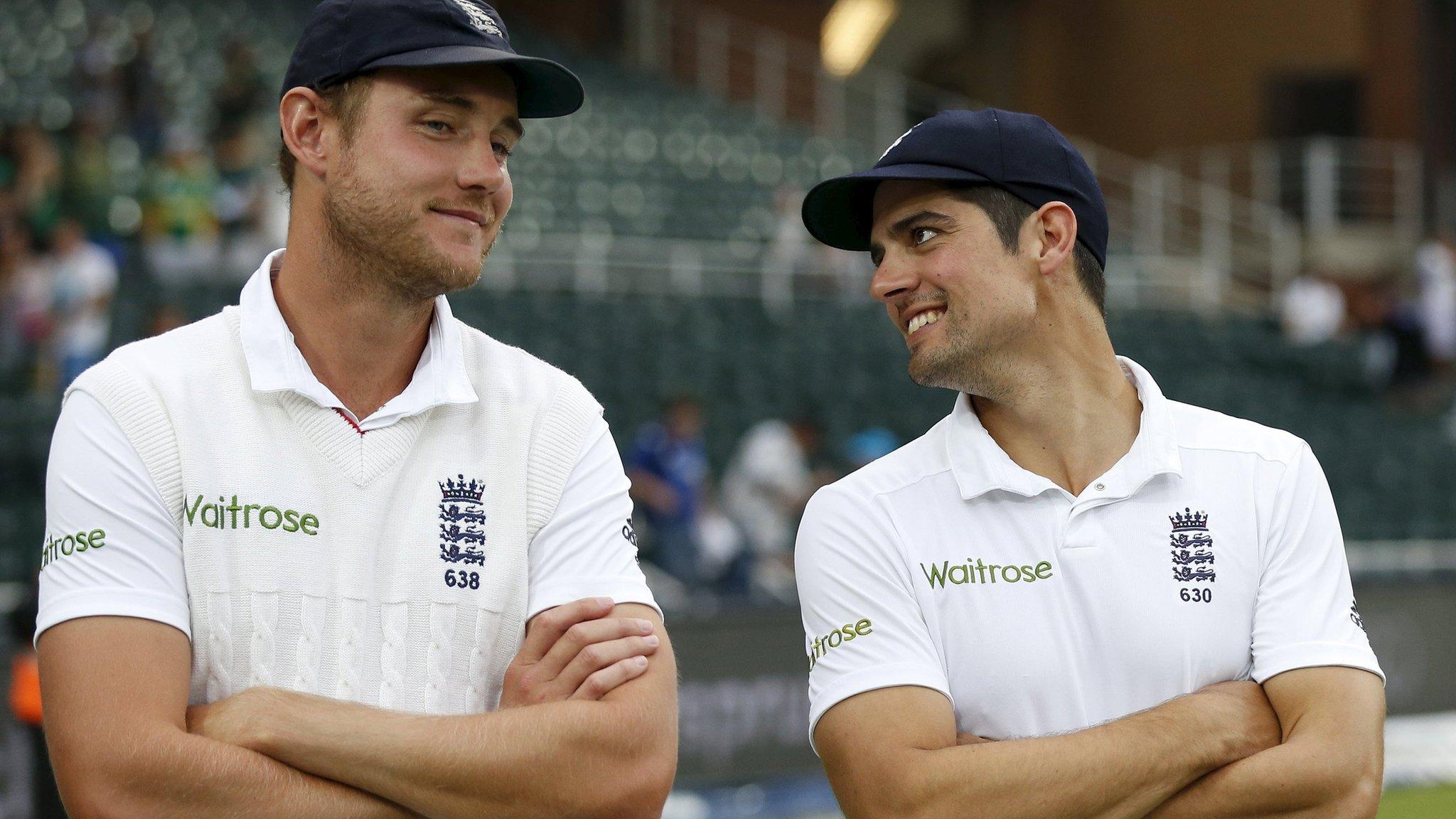
- Published16 January 2016
- Published10 March 2019

- Published15 May 2018

- Published18 October 2019
